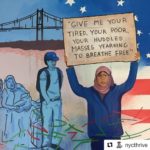Psalm 12 (CEB)
Help, Lord, because the godly are all gone;
the faithful have completely disappeared
from the human race!
2 Everyone tells lies to everyone else;
they talk with slick speech and divided hearts.
3 Let the Lord cut off all slick-talking lips
and every tongue that brags and brags,
4 that says, “We’re unbeatable with our tongues!
Who could get the best of us with lips like ours?”
5 But the Lord says, “Because the poor are oppressed,
“Because the poor are oppressed,
because of the groans of the needy,
I’m now standing up.
I will provide the help they are gasping for.”
6 The Lord’s promises are pure,
like silver that’s been refined in an oven,
purified seven times over!
7 You, Lord, will keep us,
protecting us from this generation forever.
8 The wicked roam all over the place,
while depravity is praised by human beings.
Our words have the power to bind us together in solidarity. They also have the power to destroy community. The society described by the psalmist is falling apart at the seams because of how people talk to each other. The addictive habit of deceptive, self-interested speech has cultivated mistrust, causing community to crumble. The most vulnerable members of this society are the object of these slick political maneuverings. They are the ones who experience the violent consequences of an individualistic society built on lies. They are told that they are disposable, and consequently, this is how they are treated. The psalmist clings to the promise that God will no longer allow this suffering to continue.
In the midst of a suffocating society that celebrates deceptive speech and the violence it enables, God speaks up. Having heard the cries of the oppressed, God steps into the chaos and brings relief to those who suffer, enacting justice on their behalf. That the truth of God will prevail over the lies of a splintered society is the hope to which we cling as we journey in solidarity with all who suffer. Jesus promised that the Spirit of God would guide the people of God into all truth (John 16:13).
How then will the people of God walk in the way of Truth?
When politicians speak and behave as though they are above reproach, will the people of God stand up and speak truth to power?
When fearful speech dehumanizes refugees and vitriolic words demean immigrants, will the people of God speak words of consolation and hope that comfort and empower?
When our youth demand an end to the church’s silence and hypocrisy in issues of justice, will the people of God abide in integrity, aligning our words and actions?
May the words we speak bind us together in solidarity.
Lauren Grubaugh is a Master of Divinity student at Fuller Theological Seminary. She serves on the committee for Latino/Hispanic Ministry at All Saints Church in Pasadena, and is in the ordination process in the Episcopal Church. As a conversation catalyst, translator and organizational strategist, Lauren supports communities that seek to build bridges of understanding through multilingual, multicultural ministry.
Devocional en Español:
LECTURA: ÉXODO 1:15-17 (NVI)
“15 Había dos parteras hebreas, llamadas Sifrá y Fuvá, a las que el rey de Egipto ordenó: 16 —Cuando ayuden a las hebreas en sus partos, fíjense en el sexo: si es niño, mátenlo; pero si es niña, déjenla con vida. 17 Sin embargo, las parteras temían a Dios, así que no siguieron las órdenes del rey de Egipto sino que dejaron con vida a los varones.”
LA VOCACIÓN DE PARTERAS DEL REINO DE LA VIDA
Recuerdo a una pareja pastoral latina muy querida mía que hace varios años tuvo que hacer una decisión muy arriesgada en su vida ministerial y cívica. Reunieron a un grupo de líderes muy cercanos y después de orar por su viaje, salieron ambos rumbo a la frontera a recoger tres criaturas de 5, 7 y 8 años de edad que habían estado separados de sus padres por 2 años. Alguien los iba a pasar por la frontera y no había nadie de confianza que los pudiera recibir de este lado del norte. Eran hijos de una pareja de miembros de su iglesia. Sencillamente un buen día, contactaron a sus pastores y les dijeron: “nuestros hijos vienen en camino necesitamos ayuda, por favor ayúdennos.”
Este es obviamente un caso complejo y muy frecuente en nuestro medio que pone a prueba nuestra vocación pastoral y nuestro paradigma ético social. Cabe preguntarnos: ¿sabemos cuál es nuestra vocación cristiana?¿Dónde descansa nuestra lealtad última? ¿Qué paradigmas éticos orientan nuestras acciones y reacciones?¿Qué riesgos públicos estamos dispuestos a asumir para cumplir lo que entendemos es la voluntad de Dios? Estas son preguntas que debemos contestar tod@s aquell@s que nos vemos como discípulos de Jesús en el contexto de los Estados Unidos y otras regiones de migración masiva. No importa el color de piel, el género, la clase social, cuándo migraron nuestros ancestros, la etnia, la tradición o la etiqueta política que usemos para identificarnos. Estas preguntas hacen parte de nuestra generación globalizada del norte. Las tendremos que contestar con hechos y razonamientos en esta tierra y frente a nuestro Señor, un día.
En nuestro primer devocional ubicamos a la familia de Abraham en un contexto migratorio, de dependencia, vulnerable y sin privilegios territoriales funcionando en base a dos paradigmas: migración y fe. Ambos responden a lo más esencial del ser humano la vida y la subsistencia. Optar por la vida mientras migramos y mientras creemos es parte de la raíz judeocristiana. Cuando perdemos de vista este genotipo y caemos reos de retóricas modernas excluyentes podemos fácilmente perder nuestro sentido de vocación cristiana y ética social.
Estos pastores tuvieron que hacer una decisión muy propia y muy difícil y arriesgada a favor de la vida de 5 individuos que conformaban una familia de su congregación. Su vocación y ética apuntaron hacia la vida y la esperanza de un sistema legal más justo. De hecho, vino en los 80’s y los niños y sus padres fueron regularizados.
Me parece a mi que cuando estos pastores se encuentren con las hermanas Sifrá y Fuvá en el cielo, celebrarán juntos y contarán como sus temores ante las leyes imperiales fueron superados por el Temor de Dios y el amor a su pueblo.
Nuestro llamado cristiano no es el de actuar como comisarios de migración del gobierno sino como parteras del reino de la vida al estilo Sifrá y Fuvá.
—————————————
Rev. Oscar García-Johnson, PhD
Facultad del Seminario Teológico Fuller
Miembro de “Comunidad Sin Fronteras”, Glendale, CA.
—————————————
Laguna Beach, CA, USA




